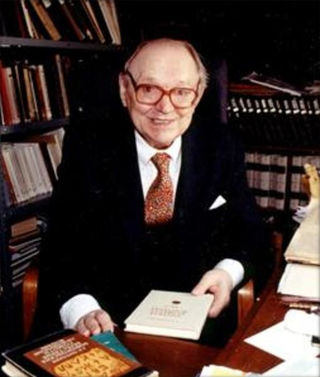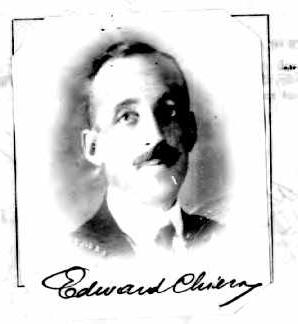
William Foxwell Albright was an American archaeologist, biblical scholar, philologist, and expert on ceramics. He is considered "one of the twentieth century's most influential American biblical scholars."
Indology, also known as South Asian studies, is the academic study of the history and cultures, languages, and literature of the Indian subcontinent, and as such is a subset of Asian studies.

Omeljan Yosypovych Pritsak was the first Mykhailo Hrushevsky Professor of Ukrainian History at Harvard University and the founder and first director (1973–1989) of the Harvard Ukrainian Research Institute.
The American Society of Overseas Research (ASOR), founded in 1900 as the American School of Oriental Study and Research in Palestine, is a non-profit 501(c)(3) organization based in Alexandria, Virginia, which supports the research and teaching of the history and cultures of the Near East and Middle Eastern countries. ASOR supports scholarship, research, exploration, and archeological fieldwork and offers avenues of disseminating this research through their publications. ASOR also provides support for undergraduates and graduates in institutions of higher education around the world pursuing studies of the history and cultures of the Near and Middle East.

Sir Jadunath Sarkar, was a prominent Indian historian and a specialist on the Mughal dynasty.

Frederic Henry Gravely was an eminent British arachnologist, entomologist, botanist, zoologist and student of archaeology, who conducted pioneering research and wrote extensively on various subjects during his tenure at the Indian Museum, Calcutta, and the Government Museum, Madras.

Bhashacharya Acharya Suniti Kumar Chatterjee was an Indian linguist, educationist and litterateur. He was a recipient of the second-highest Indian civilian honour of Padma Vibhushan.

Vladimir Fyodorovich Minorsky was a Russian academic, historian, and scholar of Oriental studies, best known for his contributions to the study of Persian, Lazi, Lurish, and Kurdish history, geography, literature, and culture.

Albert Tobias Clay was an American professor, historian and Semitic linguist. He was professor of Assyriology and Babylonian Literature at Yale University and served as founding curator of the Yale Babylonian Collection.

Tawfiq Canaan was a pioneering Palestinian physician, medical researcher, ethnographer, and Palestinian nationalist. Born in Beit Jala during the rule of the Ottoman Empire, he served as a medical officer in the Ottoman army during World War I. During British rule, he served as the first President of the Palestine Arab Medical Association founded in 1944, and as the director of several Jerusalem area hospitals before, during, and after the 1948 war. Over the course of his medical career, he authored more than thirty-seven studies on topics including tropical medicine, bacteriology, malaria, tuberculosis, and health conditions in Palestine, and contributed to research that led to a cure for leprosy.
Tell Billa is an archaeological site near Bashiqa in Nineveh Province (Iraq) 20 kilometers northeast of Mosul. Beginning in Middle Assyrian times the ancient city, not far from Assur, was named Shibaniba. Its earlier name is not known. In 2022 it was proposed that Tell Billa was the site of the Ur III period Hurrian city Šimānum.

Edward Chiera was an Italian-American archaeologist, Assyriologist, and scholar of religions and linguistics.
William Norman Brown was an American Indologist and Sanskritist who established the first academic department of South Asian Studies in North America and organized the American Oriental Society in 1926. He was the Professor of Sanskrit at the University of Pennsylvania for most of his academic career. He was president of the Association for Asian Studies in 1960. He is considered the founder of the field of South Asian Studies, which he pioneered in his career over four decades at the University of Pennsylvania, where he helped to found the Department of Oriental Studies (1931), and later single-handedly founded the Department of South Asia Regional Studies (1948). These departments are now survived by the departments of East Asian Languages and Civilizations, Near Eastern Languages and Civilizations, and South Asia Studies. W. Norman Brown also founded the American Institute of Indian Studies, which was located in the Van Pelt Library at the University of Pennsylvania. Brown was elected to the American Philosophical Society in 1946.

Krishna Venkateswara Sarma (1919–2005) was an Indian historian of science, particularly the astronomy and mathematics of the Kerala school. He was responsible for bringing to light several of the achievements of the Kerala school. He was editor of the Vishveshvaranand Indological Research Series, and published the critical edition of several source works in Sanskrit, including the Aryabhatiya of Aryabhata. He was recognised as "the greatest authority on Kerala's astronomical tradition".
Sak is a Sino-Tibetan language of the Sal branch spoken in Bangladesh and Myanmar.
Vishnu Sitaram Sukthankar, also known as V. S. Sukthankar, was an Indologist and scholar of Sanskrit. He is principally known as the General Editor of the Critical Edition of the Mahabharata published by the Bhandarkar Oriental Research Institute in Pune, India.

Prof. Christopher A. Rollston is a scholar of the ancient Near East, specializing in Hebrew Bible, Greek New Testament, Old Testament Apocrypha, Northwest Semitic literature, epigraphy and paleography.

Caroline Ransom Williams was an Egyptologist and classical archaeologist. She was the first American woman to be professionally trained as an Egyptologist. She worked extensively with the Metropolitan Museum of Art (MMA) in New York and other major institutions with Egyptian collections, and published Studies in ancient furniture (1905), The Tomb of Perneb (1916), and The Decoration of the Tomb of Perneb: The Technique and the Color Conventions (1932), among others. During the Epigraphic Survey of the University of Chicago Oriental Institute's first season in Luxor, she helped to develop the "Chicago House method" for copying ancient Egyptian reliefs.

Eunice Rockwood Oberly was a librarian who spent her career with the United States Department of Agriculture. She is best known for her work as the librarian of the Bureau of Plant Industry and for compiling the Check List of Publication of the State Agricultural Experiment Stations on the Subject of Plant Pathology 1876-1920.












